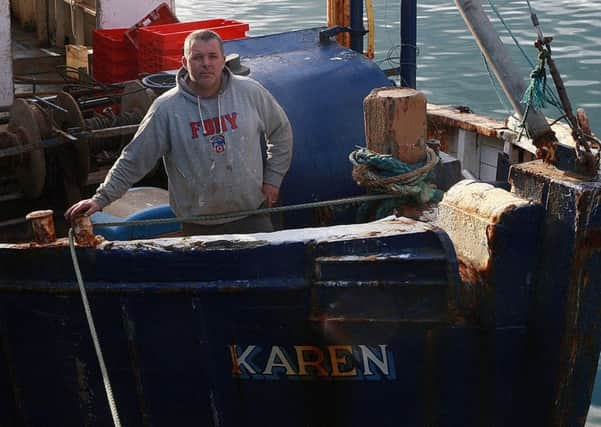Skipper slams Royal Navy for almost sinking his boat


The lives of the crew were endangered after the Karen was trailed backwards at seven knots in April 2015 15 miles from Ardglass - one of Northern Ireland’s main fishing ports in the south east, inspectors said. They nearly capsized but were saved because the nets released after 30 seconds.
Royal Navy submarine commanders were unaware of the collision until three hours later after they failed to realise they were passing beneath a fishing vessel with nets rather than a merchant cargo or passenger ship, a Marine Accident Investigation Branch (MAIB) report said on Thursday.
Advertisement
Hide AdAdvertisement
Hide AdShip’s captain Paul Murphy said: “The Navy have said that they have put in place 12 new recommendations for the (avoidance) protocol and changes but we are not privy to that so the Navy has to meet with us, explain their decisions on it and I think give us some more information on the actual incident.
“Give the fishing industry a bit more confidence back in them.
“If they come clean about exactly what happened, why it happened, where their downfalls were, then we can understand it better and then get on with it but they have to come and talk to us.”
According to investigators it was five months before the Navy confirmed one of its submarines had been involved and 10 months before it provided evidence to the MAIB inquiry. The Royal Navy had shown “reluctance to fully engage” in the investigation and that had delayed the report.
Advertisement
Hide AdAdvertisement
Hide AdThe Navy has said it is willing to pay compensation and revised its procedures to reduce the risk of such an incident happening again.
Commanders of the submarine had thought the area was primarily used by merchant cargo ships whenever it was more commonly frequented by vessels with nets.
The MAIB said that was predictable and should have been identified as a risk.
Officers did not detect the sonar noise associated with trawling and did not know they had snagged the Karen until three hours later so did not surface immediately to help.
Advertisement
Hide AdAdvertisement
Hide AdPart of the prawn trawler’s deck had to be lifted and another section was ripped off.
Mr Murphy added: “It was lucky that it crossed my mind what it was at the time and I was able to ascertain that it was nothing else only a submarine could be doing what it was doing to the boat and I made the conscious decision then to release the fishing gear which saved us at the end of it.
“And they say your life flashes before your eyes - it does.”
The skipper said he was “absolutely furious” at how the Royal Navy had conducted itself, claiming there was a lack of information and transparency throughout the investigation.
Advertisement
Hide AdAdvertisement
Hide Ad“From the get-go it was doomed to failure, this trip by the submarine.
“The high speed transit of the Irish Sea, if they had realised the amount of traffic of trawlers, fishing vessels and other ships in there they would not have done it.”
He claimed it was like playing Russian roulette with people’s lives.
“The Royal Navy must have lost touch with the fishing industry. I thought after the Antares incident that things would have gotten better, a protocol in place was supposed to have made us all feel safe.”
Advertisement
Hide AdAdvertisement
Hide AdProcedures to prevent such accidents were introduced after a similar incident off Scotland in 1990 when the four man crew of the trawler Antares died when it sank.
A Royal Navy spokesman said: “We have expressed our regret and remain sorry for the incident and delay in confirming our involvement.
He added: “We’re reviewing the report’s recommendations and continue to work closely with the maritime community to maximise safety.”
Steve Clinch, MAIB chief inspector of marine accidents, said the Navy’s reluctance to fully engage in the investigation resulted in the report taking significantly longer to deliver than normal.
Advertisement
Hide AdAdvertisement
Hide Ad“The accident happened because of insufficient passage planning by the submarine’s command team and their failure to follow guidance on fishing vessel avoidance.
“Had its trawl warps not parted, it is almost inevitable that Karen would have capsized and sunk; the collision also presented a very significant risk to the submarine.”